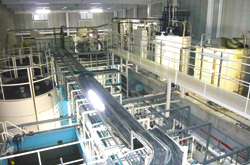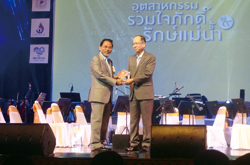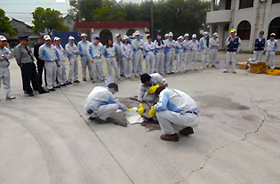Initiatives for Reducing Impacts on the Environment Back Number (2016)
Back to Latest Initiatives for Reducing Impacts on the Environment
Basic Approach
Plant effluents and emissions can be a source of water, air, and soil pollution that poses a threat to local communities. At the Minebea Group, we believe that harmony with local communities is indispensable to our business activities, and as such, we are striving to reduce our impact on the environment.
Results of FY2015 Initiatives
The Minebea Group ensures compliance with the environmental laws and regulations of each country and locality. For plant wastewater and other types of waste that are hard to manage, we have established voluntary environmental standards exceeding the national and local regulations and monitor waste management on a daily basis. In FY2015, at all of our Group plants, we further strengthened daily monitoring and environmental patrols to ensure there are no leakages, foul odors, noise, vibration or other issues that could inconvenience surrounding communities.
Plant Initiatives
Plant Wastewater Purification

Fujisawa Plant's wastewater processing facility
Prior to releasing wastewater into rivers, Minebea Group plants use their own processing equipment to purify wastewater to within fixed environmental standards. These plants adhere to environmental laws of the countries and localities in which they operate, and independently monitor such wastewater discharges, including regular testing for such metrics as pH1, COD2, BOD3, SS4, and the oil content of n-hexane extracts5.
- pH : A scale indicating whether substances are acidic or alkaline. pH7 is neutral. pH values below 7 indicate increasing acidity, while values above 7 indicate increasing alkalinity.
- COD (chemical oxygen demand) : The amount of oxygen consumed to oxidize organic substances (pollution) in water. COD measurement takes less time than BOD measurement, but is less reliable. COD is generally used as a metric in wastewater management for sea, lake, and marsh waters.
- BOD (biological oxygen demand) : The amount of oxygen required for bacteria to consume and decompose organic matter (pollution) in water. Higher values indicate greater degrees of pollution. Measurement takes several days. BOD is generally used to observe effluent water in rivers.
- SS (suspended solids) : The volume of substances suspended in water. The higher the number, the greater the degree of water pollution.
- n-hexane extracts : Substances extracted from oils and detergents that are difficult to volatilize in water using a substance called n-hexane as solvent. In this report they signify mineral oils.
Bang Pa-in Plant Wins Award for Excellence in Water Quality Conservation (Thailand)

Mr. Masayuki Imanaka, General Manager of Regional Affairs for South East Asia, receives award from Mr. Pramot Wittayasuk, Deputy Minister of the Ministry of Industry of Thailand
Ministry of Industry as part of its "The Factories Love Rivers Project." The award recognizes the company's efforts to protect the environment and preserve water quality. The ministry's project celebrates the 83rd birthday of Her Majesty Queen Sirikit (August 12, 2015) by promoting awareness and understanding of the importance of environmental conservation and restoration.
At the award ceremony held at the National Theatre in Bangkok, Mr. Masayuki Imanaka, General Manager of Regional Affairs for South East Asia, received the award from Mr. Pramot Wittayasuk, Deputy Minister of the Ministry of Industry of Thailand. A total of six companies received awards.
Investigating Landfill Waste Sites (Japan, Thailand, China, etc.)
At each plant and office, there are types of waste which are difficult to reuse or recycle within the site. In these cases, the waste is disposed of through third-party waste disposal companies.
The Minebea Group selects reliable waste disposal companies, and conducts regular inspections of their disposal sites to confirm the status of waste disposal and management. We will continue to cooperate with waste disposal companies to ensure that their waste disposal processes do not generate soil, water, or air pollution.
At the Karuizawa Plant, employees made inspection visits in July 2015 to a disposal subcontractor for sludge, waste acid, waste alkali, and waste oil, and to another disposal subcontractor handling low-density polychlorinated biphenyls (PCB) waste and PCB-contaminated waste.
In September, plant employees made inspection visits to disposal subcontractors for waste oil and waste plastics, respectively.
In November, plant employees made an inspection visit to a disposal subcontractor for sludge, waste plastics, waste oil, and waste metals, while in December, they made an inspection visit to a disposal subcontractor for glass, ceramics, sludge, waste plastics, and wood chips.

Karuizawa Plant employees make inspection visits to waste disposal subcontractors
Operation of Plant Wastewater Zero System (Thailand & China)
The Minebea Group operates plants which use large amounts of water in the processing of manufactured products and take measures to reduce emissions of wastewater. Our plants purify used water to reduce the level of waste to below standards required by each country and locality before releasing the water into the environment. Despite these measures, we cannot guarantee that the released water has zero impact on the surrounding environment. At our plants in Thailand and China, which use large amounts of water, we have adopted the "Plant Wastewater Zero System" to reduce to as close to zero as possible the wastewater released and its impact on the environment.
In this system, the plants further purify wastewater that was previously treated and released into the environment, and then reuse the entire amount of wastewater internally at the plant without any external emissions. Currently, this system is being used by the Bang Pa-in and Ayutthaya plants in Thailand, as well as the Shanghai and Xicen plants in China.

Bang Pa-in Plant "Plant Wastewater Zero System"

Xicen Plant "Plant Wastewater Zero System" building
Management of PRTR-controlled Substances (Japan)
In accordance with the Pollutant Release and Transfer Register (PRTR) Law, all of our places of business in Japan manage the amounts of PRTR-controlled substances used and transported.
Reported Results for FY2015
| Control number | Substance name | Volume handled | Emission Volumes | Transfer volumes | ||
|---|---|---|---|---|---|---|
| Air | Water | Landfill | Waste | |||
| 71 | Ferric chloride | 2.35 | 0 | 0 | 0 | 0 |
| 384 | 1-bromopropane | 19.33 | 17.40 | 0.00 | 0.00 | 1.30 |
| 438 | Methylnaphthalene | 1.56 | 0.01 | 0 | 0 | 0 |
| Total | 23.24 | 17.41 | 1.30 | |||
BCP Training Drills and Waste Oil Spill Prevention Drills (Japan)
In September 2015, the Karuizawa Plant held its 11th business continuity plan (BCP) training drill. The drill simulated the impact of an earthquake with an intensity of upper 6 on the Japanese scale of 7 in nearby Matsumoto City and simultaneous quakes directly under Tokyo and along the Nankai Trough. As part of the drills, employees practiced ways to prevent oil spills in the event of a spill inside the plant during such a disaster.

BCP training drill and countermeasure headquarters

Oil spill prevention drills
Chemical Substance Leak Preparedness Training (China)
The Shanghai and Xicen plants in China conduct emergency response training through chemical substance leak simulations. The Environmental Safety Committee at each plant conducts the training to minimize human injury and environmental pollution by taking appropriate measures in the event of a leak. The training is held annually for manufacturing division employees handling hazardous chemicals substances, suppliers of hazardous chemical substances, hazardous materials recovery companies, and cleaning companies.
On April 21, 2015, the Xicen Plant held a training session for 42 of its employees. The Shanghai Plant, meanwhile, held a training session on April 23 for 38 personnel. During the sessions, members of the Environmental Safety Committee’s Chemical Substances Management Group and the local fire departments trained participants on deploying absorbent materials to prevent the spread of hazardous chemicals during a spill, measures to take in the event of injuries, and emergency communication procedures.

Chemical substance leakage preparedness training session at Shanghai Plant

Chemical substance leakage preparedness training session at Xicen Plant
Future Issues and Goals
The Minebea Group continues to conduct business operations in compliance with environmental laws in Japan and around the world, and is proceeding with cleanup work in areas where it has caused environmental contamination in the past.














